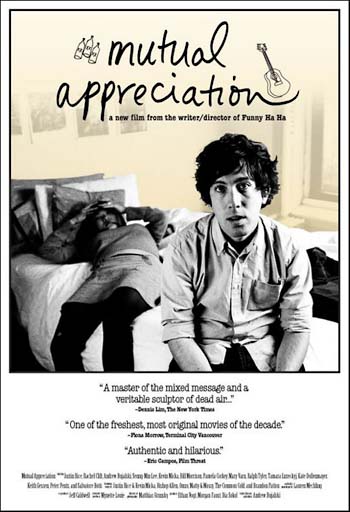 (2006, directed by Andrew Bujalski, 110 minutes, U.S.)
(2006, directed by Andrew Bujalski, 110 minutes, U.S.)
BY DAN BUSKIRK FILM CRITIC Andrew Bujalski’s 2002 debut Funny Ha-Ha was such a dead-on portrait of confused urban twenty-somethings that I was curious to catch his well-reviewed follow-up, Mutual Appreciation in the theater. Would a young audience find this devastatingly unvarnished study of dumb-struck hipsters funny, or would the humbling awkwardness of the main characters hit too close to laugh along with? Alas, I still don’t know; when I caught the film during its brief run at the Ritz in Center City, there were only three other attendees, all of them over 60 and munching silently on their popcorn. Maybe they found its black and white French New Wave style nostalgic, but they seemed to find this younger generation somewhat inscrutable.
Catching it again on DVD this week confirms what a dazzling little gem Mutual Admiration is, although I still have no idea how this film would play to Bujalski’s peers. Even being a good generation away from these graduate students and hopeful rockers, myself, I could feel the sting of that age’s frustrations and indignities lurking just beneath the film’s humor. I could see how the melancholic whimsy of Wes Anderson would be more alluring for many than Bujalski’s grainy black and white Brooklyn.
At first glance the story seems incidental to Bujalski’s languorous long-take shooting style, but at second look, its set-up is pretty standard for romantic comedies: Ellie is in a nice but uninspiring relationship with graduate student Lawrence (writer/director Bujalski) when she finds her interest shifting to Lawrence’s best friend Alan (Justin Rice of the band Bishop Allen), an aspiring indie pop musician who just arrived from Boston to take Brooklyn by storm.
The building sexual tension between Ellie and Alan unfolds at the most leisurely pace imaginable as the players each have a very modern indirectness that keeps them from charging toward their romantic folly. Is it Alan’s rock star narcissism that stops him from realizing that Ellie is giving him “the hint” when she flops on his bed and complains about her boyfriend? Instead of watching the couple drawn passionately towards each other, we see them stall with endless, goofy anecdotes, philosophizing about “getting it together” and being interrupted by their cell phones until finally one of them gets the nerve to take the other’s hand. Their all-too-real fumbling will make you so anxious you’ll feel like you are snooping in from the other side of the bed.
Bujalski is an absolute genius at getting consistent and unmannered performances from a cast of non-professionals. Like Richard Linklater’s Slacker, many of them are so deep into their poses that you might imagine they’re using their screen time to showcase their everyday shtick. The leads are even better. Justin Rice is amiable and a little meek under his Greg Foreman hair and Mod stage clothes, yet he delivers his Kinks-ish show opener with a verve that would slay them at Johnny Brenda’s. It’s a little heart-breaking to see Alan forced to grovel to his jerky dad for some much-needed cash. Rachel Clift’s Ellie has an unmannered charm you could easily imagine attracting multiple suitors, and it’s a credit to her ease and likability that we can watch her measure up both guys without coming off manipulative or shallow.
Bujalski himself was so believably annoying in Funny Ha-Ha as a guy so intimidated by his date’s good look that he can’t stand the pressure and finally sabotages the night. Here, without any distracting gimmicks he plays a character just the opposite, a nice guy so lacking in malice that he pauses, in the middle of an argument with Ellie, to list the drink options in his tin of tea. Perhaps Bujalski the writer is a little too kind as well, allowing all these romantic entanglements to easily untangle before the lovers get too ruffled. It gives Mutual Appreciation a certain lightness, yet the story never feels slight. It’s because Bujalski has a vision drawn from perceptive observations of the people around him, as opposed a style cobbled together from the reflexes of past film masters. That difference gives his work a quality that bristles with life and is too rare to ignore.
